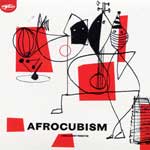Even without its novel-like back story, Afrocubism is a project of insane ambition. Cuba’s Eliades Ochoa (tres, cuatro, vocals), as well as Malian maestros Djelimady Tounkara (guitar), Toumani Diabaté (kora), Bassekou Kouyaté (ngoni), and Kasse Mady Diabaté (vocals) all lead bands of their own. So that’s five chiefs steering an ensemble that includes Cuban and Malian percussionists and backing singers, balafon virtuoso Lassana Diabaté, and a brass section to boot. The first track, “Mali-Cuba” opens with a pendulous Cuban bass line establishing a deep Guantanamera-esque groove. Then with a strum of cuatro, the instrumentalists pounce all at once. Each one pokes above the sea of jangling notes for a brief introductory solo, and the wild ride that is Afrocubism begins. Cuban rhythms and Malian filigree riffing are the staples as these 14 tracks shift the focus among the individual musicians here, each one a staggering talent in his own right. But more on that in a moment.
Back to that novel-like back story. In 1996, UK producer Nick Gold of World Circuit Records planned to bring together Djelimady, Bassekou and members of the Cuban son band Sierra Maestra for an experimental Mali-Cuba session. As the legend goes, the Malians never made it to Havana. (By chance, I was living with Djelimady in Bamako that spring. My book In Griot Time offers some intriguing embellishment on this plot twist.) In Cuba, Gold had to scramble to fill out his session, and the result was The Buena Vista Social Club, far and away the biggest selling “world music” album ever made. With all that as prologue, and 14 years under the bridge for all concerned, Gold assembled an enhanced cast of Malian (more precisely Mande) and Cuban players in Madrid, Spain, to revisit his original idea. This CD, and a tour that includes three North American dates in November, 2010, are the result.
A few tracks recall the folksy charm of Buena Vista hits. Ochoa’s smooth but weathered vocal sets the tone on the melancholy “Al Vaiven de mi Caretta,” to which Kasse Mady adds an elegant croon of his own on one verse. Decades ago, Kasse Mady got his start singing in Badema National, one of Mali’s most revered Afro-Latin bands, which reminds us that part of the reason this idea works is because a crucial generation of Malian musicians came of age under a regime that leaned towards the Soviet side of Cold War politics, and sent musicians to Havana for musical training. “A La Luna Yo Me Voy (To the moon I go away)” also evokes this sentimental journey, with Ochoa taking the lead, and Bassekou offering a tasteful ngoni break.
Djelimady steps out forcefully on electric guitar on “Djelimady Rumba.” Though raised in Mande griot tradition, Djelimady gravitated to the guitar early on, and used to spend hours hunkered down with a radio, playing along with Cuban songs that were standard fare in the heady early days of Malian independence. These days, he is so accustomed to merging the flavors and dialects of West African and Latin music that this foray feels delightful and effortless. Virtuosity and panache are givens where Djelimady is concerned.
Toumani’s brilliant mastery of the kora comes to the fore on “Beséma,” another Cuban groove transformed by a distinctly Mande harmonic progression. There are a couple of well-known African songs here, notably “Jarabi,” which is more or less the “Take 5” of Malian bands—everyone plays it. Here and on “Mariama,” perhaps Kasse Mady’s pinnacle moment on the session, the composition is African, but once again the feel remains Cuban. Only the dark, pentatonic balafon feature “Dakan” settles into a strongly African rhythmic foundation. So this session is really more about Malians fitting into and paying homage to Cuban music than the reverse.
That is fitting enough given the history, and with a preponderance of Malian participants, the Mande music presence remains strong throughout just the same.It must be said that these maestros show great respect for one another and function surprisingly well as an ensemble.They strike an impressive balance between grandstanding competition and excesive deference.My guess is that this will be even more so in concert, now that the group has had some time to coalesce.
It must also be said that having so many busy players, whose instruments often fall into a similar frequency range, does produce a certain wooliness in the sound. In their discrete forms, Mande music, and especially Cuban music, rely on a highly ordered distribution of roles. So these tracks lack the fine hierarchical balance heard in, say, recordings by Sierra Maestra or Djelimady Tounkara’s acoustic ensemble. This rollicking session is experimental in the best sense, one reason it will likely not approach the sales performance of the accidental Buena Vista Social Club juggernaut. But kudos to Gold for persisting with an inspired idea. AfroCubism the CD is one for the ages, and the live shows promise to be historic occasions, not to be repeated soon, and not to be missed!
-Banning Eyre









